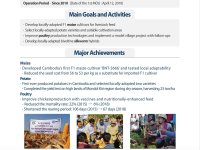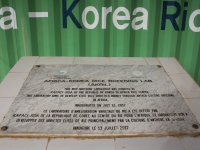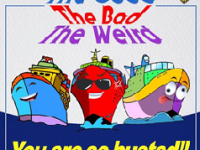The Commonwealth’s Climate Finance Access Hub supports small and vulnerable states to access sources of climate finance to meet their priority adaptation and mitigation needs and realise their sustainable development goals. The Hub helps countries to develop transformative projects required to access funds and support institutional capacity to deliver on climate finance.
Innovation Tag: Development and Aid
Case Study
KOPIA – Customized cross-border farming technologies to address poverty and rural challenges

KOPIA (Korea Program for International Cooperation in Agricultural Technology) is an innovative development cooperation platform that facilitates agricultural partnerships among partners and donors, where agricultural technologies can be efficiently scaled up and effectively commercialized. KOPIA consists of three pillars: to develop locally-customized farming technologies; to carry out pilot projects to demonstrate practical effectiveness; and to involve other donors for scaling up.
KAFACI and AfricaRice jointly developed the Africa Rice Development Partnership project to increase rice productivity in Africa. Using modern breeding technology that shortens the breeding period from 10-15 years to 3-5 years, and by crossing Korean Japonica rice with African varieties, five high-yielding varieties were developed and registered in three countries. The newly released varieties directly benefited farmers, consumers, retailers and policy-makers due to their high yield and quality.
Case Study
ASEAN Food Security Information System (AFSIS): Innovation for Agricultural Data Management &…
The Government of the Republic of Korea has implemented an ICT-based agricultural data management system through digitalization and a human capacity building program, which allows innovative data collection, analysis, and sharing in 6 ASEAN member countries. Through this, the governments have improved the paperless work process on agricultural statistics, accumulating the data and human resources for enhancing food security in the ASEAN region.
The civil war in Syria led to a massive influx of Syrian refugees to Turkey. In response to this influx, the Gaziantep Metropolitan Municipality (GMM) established Turkey's first Migration Management Directorate to lead the refugee response programme of the city. The GMM's migration policy has a humanitarian approach based on social justice and human rights. The GMM focuses on a conflict-sensitive approach to mitigate tension. The GMM's policies are based on ensuring the common welfare of…
Surviving family members of unexpected deaths (accidents, murders, suicide) are often ill equipped to process pain, cope with daily functions, fulfill social roles and maintain health. Finding one's own spiritual resources in such crises can be immensely helpful. This pilot program integrates spiritual support responses into Israel’s Ministry of Labor & Social Affairs’ Sudden Loss and Bereavement Centers and targets parents in order to build and enhance family resilience and well-being.
An innovative maritime communication system enabling:
1. Invisible and unidentifiable VHF communication becomes visible in real time with one click.
2. A ship's past routes and/or frequently navigated routes, which were previously unrecorded, will be made known through big data-based analysis that fully reflects the ship's characteristics and general routing patterns.
3. Invisible voices will be made visible through an automatic transcription system based on voice recognition.
"Defensores" is a platform designed to provide public defenders with a tool to register allegations of torture. This project was carried out in partnership with two key actors in the subject: The Ministry of Public Defense (MDP) and the National Mechanism for Prevention against Torture (MNP). Its implementation facilitates the effective and permanent monitoring of torture by public defenders and generates qualified information for different institutions and society in general. It's the first…
“TAKO – Moms” is the result of a project with the goal of developing a Minimum Viable Product to help tax administration service workers with customer service. TAKO is an online overview of all customers, which was created by the service workers themselves in collaboration with programmers. This process resulted in both exceptional improvements in the payment of VAT’s as well as large evolutions in the skills of the workers, without launching a high-cost project.
Case Study
Partnering for success: a regional monitoring system for social equity and inclusive development
A multistakeholder partnership created a regional indicators-based monitoring system to track pro-poor health policy change across the Southern African Development Community (SADC), a low-income region beset by socio-economic costs of a high disease burden. This stimulated SADC’s Result-Based Regional Monitoring and Evaluation initiative. Extending to all SADC priority areas, Results-Based Monitoring and Evaluation (RBME) enables real-time tracking of regional performance, documentation of…




